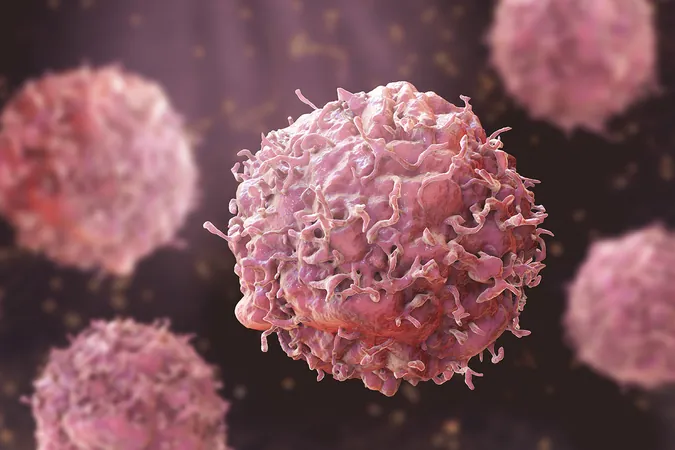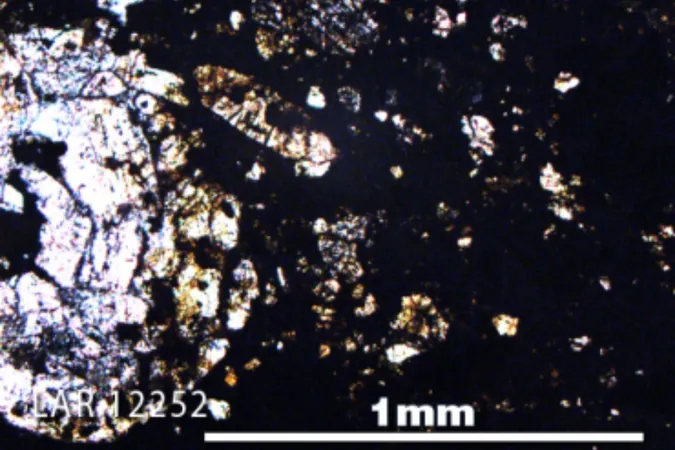
Unlocking Cancer's Secrets: How Your DNA Shapes Tumors
2025-04-15
Author: Yu
Revolutionizing Cancer Treatment through Genetic Insights
Groundbreaking research published in the journal *Cell* reveals that both inherited DNA and specific tumor mutations are crucial in shaping the evolution of cancer. This discovery paves the way for more personalized and effective treatment options.
The study highlights the role of germline genetic variants—those inherited at birth—that fundamentally influence the protein landscape of tumors across various cancer types. By utilizing precision peptidomics, a cutting-edge method for quantifying peptides related to genetic variations, researchers uncovered the significant impact these inherited variants have on individual cancer proteomes.
Your Unique Genetic Makeup Matters
According to Dr. Zeynep H. Gümüş, co-author of the study from the Icahn School of Medicine at Mount Sinai, everyone carries a unique genetic fingerprint that affects their cellular functions throughout life. 'These inherited differences are not just passive; they actively influence tumor formation, evolution, and treatment responses. This opens a gateway for cancer care tailored to both the tumor and the patient’s genetic background,' she stated.
The Shift from Tumor-Only Focus to Comprehensive Care
Fellow researcher Dr. Myvizhi Esai Selvan emphasized that this marks a significant advancement toward precision medicine that accounts for the individual rather than just the cancerous growth. The inherited genome sets the stage for how cancer evolves, impacting everything from the emergence of mutations that drive cancer to how the immune system reacts.
Traditionally, cancer research has concentrated on somatic mutations—those changes occurring in a cell during its lifetime. However, this latest study reveals that germline variants significantly outnumber somatic mutations in cancer cells, yet their influence has remained poorly understood.
Mapping the Cancer Landscape with Precision Peptidomics
The researchers combined proteomic and transcriptomic analyses to assess the effects of germline variants on cancer patients' proteomes, involving 1,064 individuals across 10 cancer types. They mapped an astonishing 337,469 coding germline variants onto peptides derived from mass spectrometry data. This meticulous approach demonstrated that germline variants affect post-translational modifications and protein stability, showcasing their allele-specific effects.
The Germline: The Stage for Cancer Drama
The findings underscore that the germline genome serves as the stage where cancer's narrative plays out, influencing everything from driver mutations to the immune response against cancer cells. 'By achieving a deeper understanding through proteomics, we can illuminate this complexity and reveal how altered protein functions are pivotal in the development of cancer,' the researchers concluded.
This pioneering research not only enhances our grasp of cancer biology but also heralds an era of more personalized cancer treatments, promising brighter prospects for patients worldwide.



 Brasil (PT)
Brasil (PT)
 Canada (EN)
Canada (EN)
 Chile (ES)
Chile (ES)
 Česko (CS)
Česko (CS)
 대한민국 (KO)
대한민국 (KO)
 España (ES)
España (ES)
 France (FR)
France (FR)
 Hong Kong (EN)
Hong Kong (EN)
 Italia (IT)
Italia (IT)
 日本 (JA)
日本 (JA)
 Magyarország (HU)
Magyarország (HU)
 Norge (NO)
Norge (NO)
 Polska (PL)
Polska (PL)
 Schweiz (DE)
Schweiz (DE)
 Singapore (EN)
Singapore (EN)
 Sverige (SV)
Sverige (SV)
 Suomi (FI)
Suomi (FI)
 Türkiye (TR)
Türkiye (TR)
 الإمارات العربية المتحدة (AR)
الإمارات العربية المتحدة (AR)